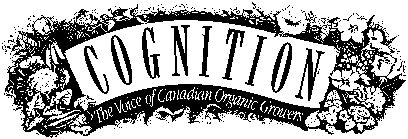

Cognition Index | Virtual Library
| Magazine Rack
Search
| Join the Ecological Solutions Roundtable
by Ann Cleary
As I write this, when we are on the brink of getting national organic certification standards legalized, there is a dissenting voice from B.C., the one province where the Ministry of Agriculture had the sense to produce standards a long time ago. The blame for the current delay, however, should not be put on the B.C. grower. It should rest solely with the federal government whose quibbling over minor points and obvious reluctance to recognize organic (ecological) agriculture at all has resulted in many private certifying agents springing up. Most of these are headquartered in other countries, making national certification more difficult.
Not that the present standards promulgated by the government, and so long in the making, indicate a real desire to encourage organic growing. It is only the fact that our growers are increasing in number along with demand from other countries for our products that the government wants us all under the Canadian umbrella.
The same thing happened in the U.K. where, for many years, the Soil Association worked hard to encourage and certify organic products. Only when the donkey work was done did the government step in to ensure that the British label would be used. There was, and still is, quite a demand for organic products from mainland Europe. The Soil Association and a few other private certification agencies finally did concur with the national standards. I hope this will be the case in Canada for the sake of national unity. In Australia, there are national standards for the organic export trade, but not within the country!
There is no doubt that the demand for organic food in North America is increasing. Recent statistics given in the Natural Foods Merchandiser (June/96) state that organic sales have increased by 21% to total $2.8 billion in 1995, exceeding $2 billion for the second year in succession (as reported in Alternative Agriculture News, July/96).
Canadian government has given very little support to organic agriculture in this country, either by encouragement or funding, unlike most of the other countries in the world. This is probably due to conglomerate pressure against it and conventional farmers’ negative views of organic methods.
Metamorphoses
Before my arrival in Canada 50-odd years ago, I was steeped in organic principles. Propounding my views in my new farming community in Eastern Ontario, I was politely called old-fashioned and told that I needed to understand modern North American farming methods. When the long-haired, bearded back-to-the-landers invaded the countryside and set up their communes, I was lumped with them as "kooky", but later, when long hair and beards appeared in the city, the "kooks" became "radicals" and were a little bit more respectable. Now I learn that organic growers are "pesticide activists", according to an opinion piece by Terry Daynard in the Ottawa Citizen (Aug. 20/96). Apparently Mr. Daynard does not know that organic growers do not use pesticides except as a very last resort, in the hope of saving the plant, and then only with plant-derived pesticides which degrade quickly in the soil. Any individual or group who dares to offer alternatives to conventional methods is now called an activist! Organic agriculture is based on sound scientific principles and does not warrant Mr. Daynard’s scathing comments.
Farming today seems to be developing, as is so much else, into a two-tiered system. On the one-hand are high-input, high-tech, big, industrialized farms aimed at high profits. On the other hand, small, low-input, moderate-income family farms are devoted to sustainability, biodiversity and rural enrichment and cohesion. There seems to be a distinct incompatibility between industrialized farming and the bio-diversity essential to sustainability.
So many articles, statistics and reports contradict what Mr. Daynard has to say about the desirability of pesticides that it is unnecessary to refute his statements. It is hard to understand why pesticides, which have been in use for nearly 50 years, have not eliminated all the insects that plague us by now. And why, I wonder, do farmers have to wear protective clothing and masks when spraying and take courses to reduce risk? It is strange that governments the world over are investing in integrated pest management (IPM) in an effort to reduce the use of pesticides. Can it be that their dangers are being universally recognized?
The danger as I see it is that as pesticides are reduced, new high tech "fixes" such as biotechnology will be introduced. Organic growers are not permitted to use genetically engineered seeds, which can seriously affect their business if labeling is not done. However, in future, nonorganic growers will undoubtedly be able to get seeds genetically modified to include a pesticide gene. There will be sweeter, more frost-proof, taller or shorter plants as required. I wonder if they will be able to incorporate an anti-raccoon gene for corn as well! By the way, I understand an FDA suggestion of calling plants with a pesticide gene "incorporated pesticidal plants" is receiving strong opposition.
Copyright © 1996.
Ann Cleary.Reprinted with permission. All rights reserved.
Info Request | Services | Become EAP Member | Site Map
Give us your comments about the EAP site
Ecological Agriculture Projects, McGill University (Macdonald
Campus)
Ste-Anne-de-Bellevue, QC, H9X 3V9 Canada
Telephone:
(514)-398-7771
Fax:
(514)-398-7621
Email: info@eap.mcgill.ca
To report problems or otherwise comment on the structure of this site, send mail to the Webmaster